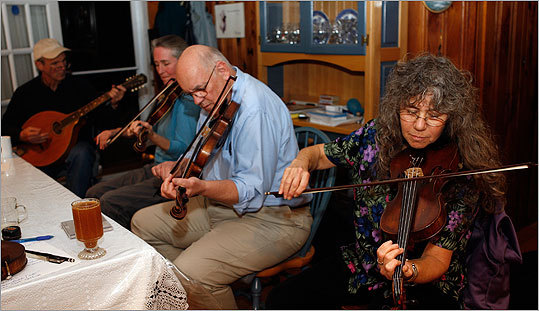
EASTHAM - The lilting notes of “St. Anne’s Reel,’’ a rollicking Canadian fiddle tune, glide out the front door and into the pitch-black night near Kingsbury Beach. Inside, eight fiddlers and a bass player tap a wooden floor with their feet, pull and push their bows, and tilt their faces toward fingers that dance atop the strings.
It’s another Monday night for the Cape Cod Fiddlers, a knot of local musicians who began gathering every week 20 years ago to catch up, leave their jobs behind, and indulge a love of music that often is centuries old.
They also are part of the glue that accounts for the remarkable staying power of the fiddle, the common man’s violin that was an indispensable element in house parties, barn dances, and social occasions that bound a community together for generations. In the hands of the Cape Cod Fiddlers, the music might be old, but the spirit that powers the tunes is as fresh as the cinnamon-spiked cider that warms on the kitchen stove.
“When I’m playing, there’s nothing else,’’ said Stuart Moore, who doubles as Chatham’s shellfish warden when he’s not carving out time to make a little fiddle music.
The group first came together through the efforts of Billy Hardy, a native of Hackensack, N.J., who moved to Eastham 37 years ago and never looked back. Seated in his house at the head of a long, thin table, Hardy is all bouncing, earnest movement as the fiddlers move between tunes with almost imperceptible ease.
“Everyone has to leave their egos at the door when we play,’’ said Hardy, one of two professional musicians in the group. The remainder come from an eclectic array of jobs: architect, graphic designer, two teachers, lawyer, and the Irish music librarian at Boston College.
“How would we all be sitting in the same room otherwise,’’ asked Hardy, delighted by the convergence.
The tunes move among the great fiddle traditions - including Scotland, Ireland, Cape Breton, French Canada, and Appalachia. The players learn from each other, teach each other, and revel in what is a constantly simmering melting pot of music.
The atmosphere, which includes a wood stove and a bearded collie named Kylah, is convivial but low-key - at least until the music starts and the sensation is one of driving sound and bobbing feet. Over 20 years, a fair amount of hair has turned gray.
For Dinah Mellin of Orleans, who studied classical music, the effervescence and physicality of the tunes are a big part of their allure. “I like the liveliness of it and the bowing,’’ Mellin said. “It’s a workout.’’
Indeed, for more than two hours last Monday, the fiddlers barely stopped, catching their breath and resting their arms only briefly while they waited for the first notes of a musical journey to somewhere new. There were waltzes, and reels, and rags, and plaintive laments, many of which they play periodically in concert.
Hardy said he had trouble finding other fiddlers when he began to play. Now, the scene is dramatically different. Informal get-togethers are much more abundant than they were a few decades ago, and instruction is plentiful, Hardy said.
Mike Falkoff, vice president of the Boston Scottish Fiddle Club, agreed the music has been revitalized. In the last three years, he said, the club’s membership has doubled to about 90 people.
“It’s amazingly crisp music,’’ Falkoff said. “I love classical music, and basically a lot of the stuff is what would have been played in 1790. It’s well-syncopated string music in a number of different sorts of rhythm.’’
Much Scottish fiddle music made its way to Boston from Cape Breton, Nova Scotia, where 18th- and 19th-century emigrants from Scotland brought traditions that continued to survive and thrive in a largely rural and isolated society. For entertainment, the fiddle was king.
“The violin sings, but the fiddle dances,’’ Hardy said about the differences in the instrument’s use. “There’s a joke that the only difference is that nobody cares if you spill beer on the fiddle.’’
Hardy, however, clearly cares about his instrument, which is of British origin from the 1800s. Other fiddles in the room were made many decades ago in Germany. And a mandocello, played by Tim Dickey of Truro, will turn 100 this year.
Hardy, like several other fiddlers here, was hard-pressed to explain precisely why he craves fiddle music.
“My gut feeling is the music is just good, and people can feel that,’’ Hardy said. “I’ve had people come up to me after a concert and say this music is therapeutic.
“I’m sure it is for us, too.’’
© Copyright 2009 Globe Newspaper Company.

No comments:
Post a Comment